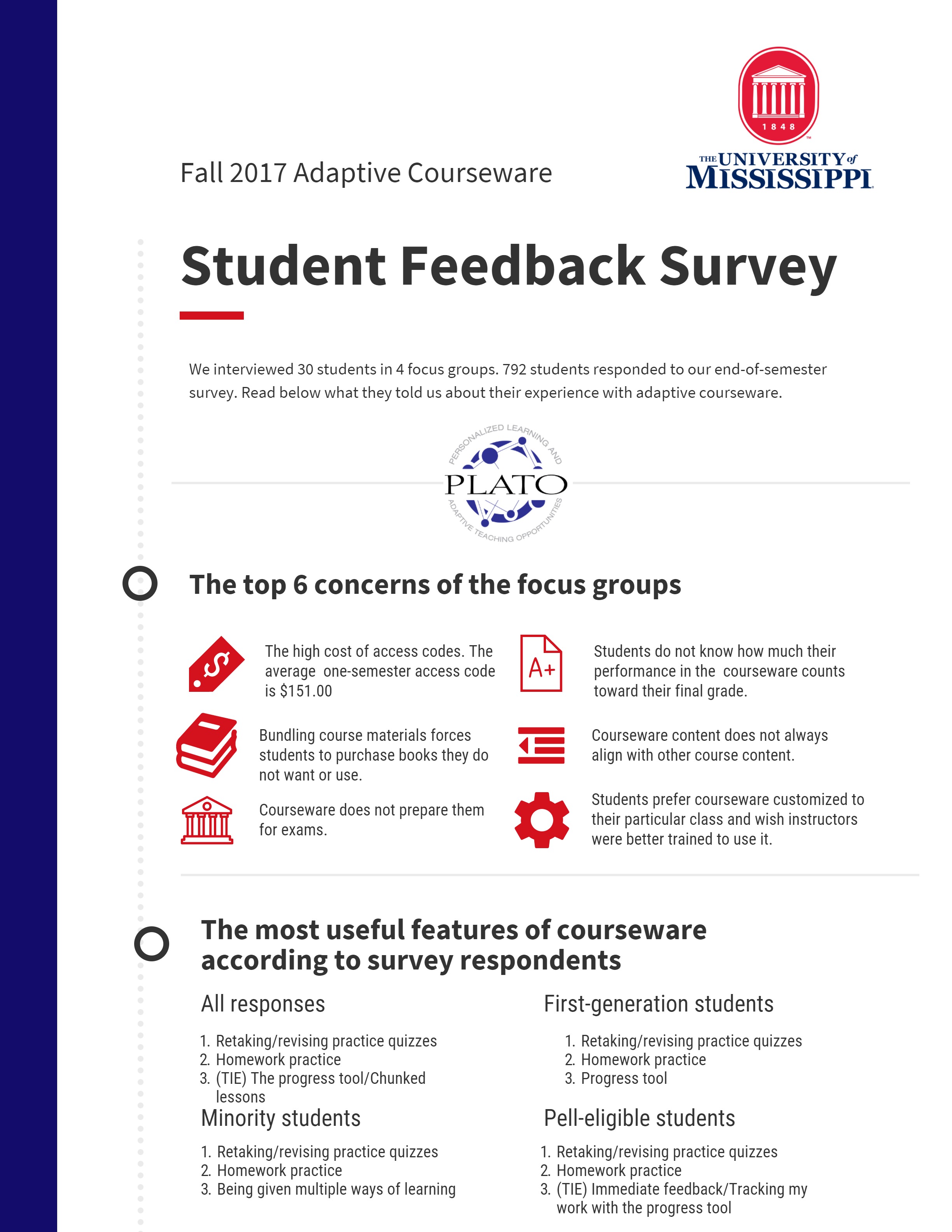Feedback on Adaptive Learning from the Student Survey and Focus Groups
| READ MORE |
Meet the research team
 Christie Forgette, a sophomore in the Sally McDonnell Barksdale Honors College and working toward a degree in elementary education, started with PLATO in Fall 2017. She leads student focus groups, transcribes audio files, codes transcripts for analysis, and creates presentations of research data in various formats. Christie helped plan and host PLATO’s first teaching awards luncheon, and co-presented PLATO research to representatives from the Gates Foundation. On April 18, 2018, she will present PLATO research at the Center for Excellence in Teaching and Learning’s Scholarship of Teaching and Learning Poster Session at the Inn at Ole Miss.
Christie Forgette, a sophomore in the Sally McDonnell Barksdale Honors College and working toward a degree in elementary education, started with PLATO in Fall 2017. She leads student focus groups, transcribes audio files, codes transcripts for analysis, and creates presentations of research data in various formats. Christie helped plan and host PLATO’s first teaching awards luncheon, and co-presented PLATO research to representatives from the Gates Foundation. On April 18, 2018, she will present PLATO research at the Center for Excellence in Teaching and Learning’s Scholarship of Teaching and Learning Poster Session at the Inn at Ole Miss.
Michael Tyler England, from St. Louis, MO, is an Early-Entry Pharmacy Student at the University of Mississippi in pursuit of a Pharm D. He joined the PLATO research team in February 2018, and is involved in conducting student focus groups, transcribing, and analysing data. Tyler is also organizing data from the Supplemental Instruction program and will be presenting it at the Center for Excellence in Teaching and Learning’s Scholarship of Teaching and Learning Poster Session at the Inn at Ole Miss on April 18, 2018.
Course Materials Matter
Student complaints about the high cost of textbooks may seem as inconsequential and predictable as their laments about the lack of convenient parking on campus, and yet there are a few key differences faculty should note. First, while faculty share the experience of parking on campus with students, they do not share the experience of being required to purchase course materials. Thus, while faculty may be aware of the cost and availability of parking spots on campus and can sympathize with how these factors might affect students’ choices about transportation, many are not aware of the cost and availability of course materials and how these factors might affect students’ choices about their education.
According to a 2016 survey of faculty by the National Association of College Stores, “the majority of faculty consider quality of content (81%) and price (74%) when selecting course materials. Quality is key as 61% indicated it is the most important factor when selecting materials, while just 10% considered cost the most important factor. Those who assign a digital textbook were 10% more likely to consider cost to students.”
However, related reports, Faculty Watch and Student Watch, found that while 87% of faculty believe the course materials they choose are essential to student success in their course, only 55% of students feel the same way about course materials.
Although there is increasing use of Open Educational Resources (OER) by faculty at colleges and universities in the U.S., thanks in large part to Z-Degree programs, only 30% of faculty are aware of these free resources and only 9% of faculty have replaced expensive textbooks with OER content.
According to a survey conducted by the Independent College Bookstore Association (ICBA), reported in the Campus Computing Project, faculty are not convinced digital course materials offer a significant value over print course materials. However, nearly half of the respondents indicated they would be more likely to adopt digital course materials if they provided learning analytics to help them better track student progress.
In PLATO student focus groups, we are learning that students at Ole Miss will often forego purchasing course materials if they perceive the course materials will not significantly help them succeed in the class. There are two factors at play here. First, digital materials such as adaptive courseware are often underutilized by faculty, who most often use them only for homework practice and the delivery of formative assessments such as weekly quizzes. According to our focus groups, faculty are not utilizing learning analytics provided by these platforms to track individual and class-wide student progress. In addition, focus group students were disinclined to purchase digital materials when the work performed in them does not constitute more than 10% of their overall grade.
Second, students are frustrated by expensive access codes to course materials that do not align with instructor lectures or high-stakes exams. High costs are an especial problem for students who pay for course materials with loans and scholarships that require them to purchase course materials through the University bookstore, which consistently charges higher prices for course materials than online third-party vendors or direct purchasing through the publisher’s website.
Some students described the digital content as a completely separate course from the instructor’s lectures, or a loosely-related add-on to the course. Others expressed frustration that faculty are not using the digital content to prepare students for exams and explained how time constraints force them to choose between completing lessons in the courseware and studying for exams. Thus, the courseware which was developed to help students succeed in a class, when misaligned with learning objectives or underutilized for learning analytics, can present obstacles for students in terms of workload and expense.
Best practices for adaptive courseware, as outlined by the PLATO Program, include
1) Integrated adaptivity: Faculty should consider choosing courseware with adaptive features integrated throughout the platform rather than the more common e-book model in which the adaptive features are add-ons.
2) Aligning content: faculty who customize a base course or build their own course in adaptive platforms have a deeper understanding of the content in the courseware and are more likely to teach that content rather than teaching from lecture notes and leaving students on their own regarding adaptive courseware content.
3) Learning analytics: at the heart of personalized learning is the data from learning analytics that allows faculty to track student progress and provide individual and class-wide interventions. These interventions not only maximize student-instructor contact hours, they target teaching so that the right lesson is delivered to the right student at the right time.
4) Active learning/flipped classroom: With base content delivered in adaptive courseware, faculty can use face-to-face contact with students to address higher-level concepts, to supervise team-based and individual practice of concepts, and to engage students in extended discussions about course concepts. When faculty flip the classroom, any worry about covering the course content goes away, because no longer do faculty have to say it for students to learn it.
5) Multi-modal content delivery: Students do not learn best when lectured at for hours a day and when individual learning consists mainly of reading texts. Students want to engage with course content, with their instructors, and with each other. This requires the presentation of content in different modalities such as video, analysis of images, graphs, and charts, student-student discussion and student-instructor discussion, collaborative practice activities, low-stakes formative assessments, and interactive digital activities.
Adaptive courseware that is aligned with other course content, reasonably priced, and utilized in such a way as to maximize student learning can make all the difference to students, and can make teaching a much richer experience for faculty.
PLATO Program numbers Spring 2018 Semester
| Course | Sections | Enrollments |
| Chem 101 | 1 | 169 |
| Chem 105 | 3 | 433 |
| Chem 106 | 8 | 771 |
| Chem 221 | 1 | 82 |
| Chem 222 | 3 | 313 |
| Bisc 102 | 5 | 349 |
| Bisc 104 | 2 | 111 |
| Bisc 207 | 10 | 211 |
| Bisc 330 | 6 | 120 |
| Writ 100 | 6 | 67 |
| Writ 101 | 12 | 194 |
| Math 115 | 12 | 531 |
| Math 121 | 8 | 355 |
| Math 123 | 5 | 193 |
| Soc 101 | 2 | 60 |
| EDHE 101 | 5 | 68 |
| Span 111 | 5 | 110 |
| Span 211 | 6 | 143 |
| Econ 202 | 3 | 120 |
| Econ 302/Bus 302 | 10 | 313 |
| Phys 212 | 2 | 49 |
| Phys 213 | 1 | 99 |
| Phys 214 | 1 | 127 |
| Phad 395 | 1 | 112 |
| MIS 309 | 1 | 125 |
| Totals: 25 Courses | 124 sections | 5,225 |
Semester Wrap-up
Please plan on attending our semester wrap-up luncheon where we’ll present feedback from the Spring 2018 student focus groups and survey.
When: Monday, May 14, 12noon – 1:30pm
Location: Lamar Hall 323, Writing & Rhetoric Conference Room




